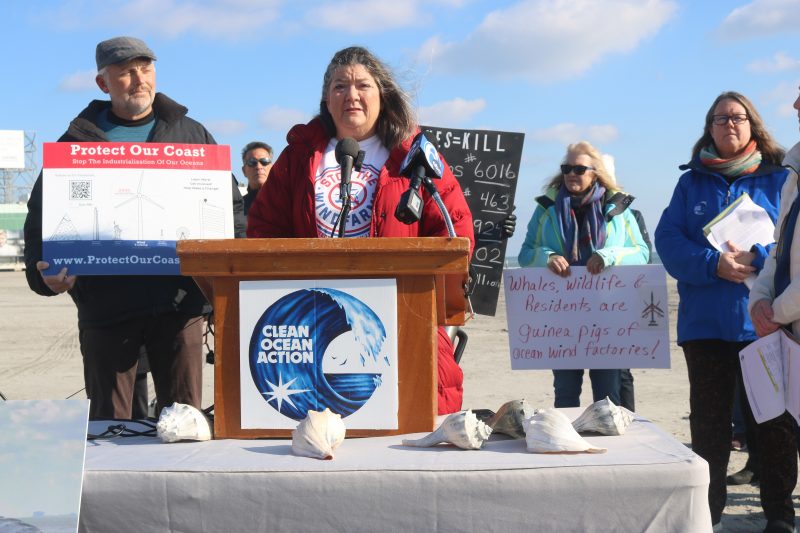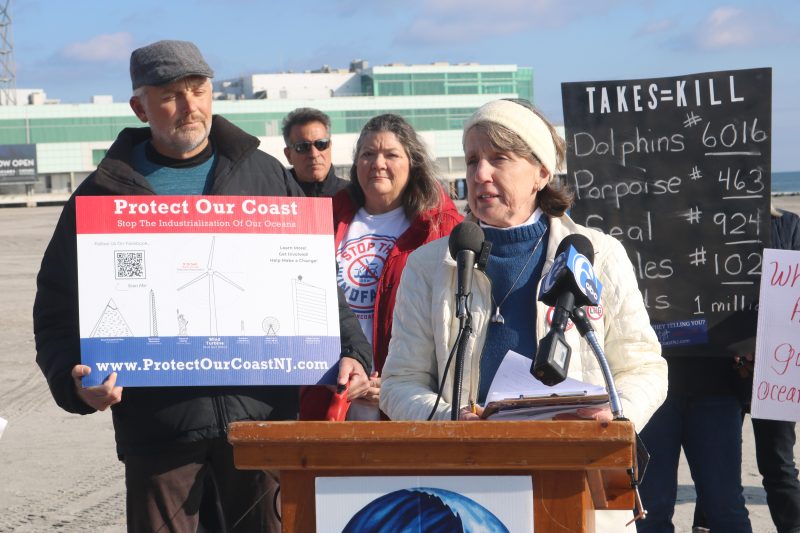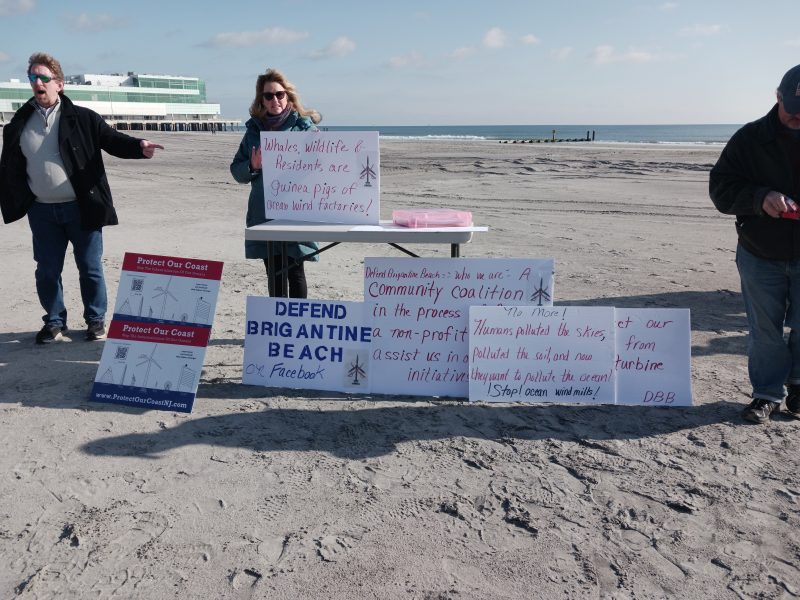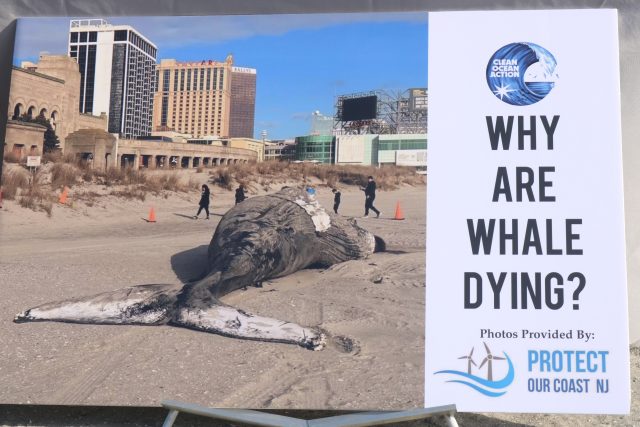By DONALD WITTKOWSKI AND MADDY VITALE
Environmental groups Monday called for a federal investigation into whether sonar mapping related to proposed offshore wind energy farms is responsible for what they say is an unprecedented series of whale deaths along the New Jersey and New York coasts.
In all, six dead whales, predominantly juveniles, have washed up in the last 33 days on the beaches from Cape May to Montauk Point, N.Y., including two in the past three weeks in Atlantic City and one in Strathmere in early December, they said.
“The wave of dead whales is the ocean sounding the alarm, and we must heed the warning,” said Cindy Zipf, executive director of the environmental group Clean Ocean Action.
At a news conference Monday headed by Zipf, a coalition of environmental groups and opponents of offshore wind energy projects urged President Biden’s administration to conduct a “transparent” investigation into why so many whales are dying.
They released a copy of a five-page letter, sent to Biden, that outlines their concerns about the whale deaths and what they believe is the government’s lax regulatory oversight of offshore wind farms.
“We are deeply troubled by the heretofore lack of a comprehensive public response from federal agencies responsible for their protection, which is required by law under the Endangered Species Act, among others,” the letter notes of the government’s oversight of whales.
The news conference was held on an Atlantic City beach where one of two dead humpback whales washed ashore in the past month. A 30-foot female whale was buried on the beach near Georgia Avenue on Jan. 7, but the stench of its carcass lingered in the air.
Cindy Zipf, of Clean Ocean Action, speaks at the news conference.
The letter to Biden from Clean Ocean Action and other environmental groups notes that some of the dead whales were buried on the beach, which may make it impossible to conduct further investigation of their remains to pinpoint the cause of death.
The Marine Mammal Stranding Center, based in Brigantine, has been taking tissue samples from some of the whale carcasses to try to determine how the humpbacks died.
Zipf and others questioned whether the whale deaths were caused by hypersonic geological surveying to map the seabed where the offshore wind farms would be located, including one that is proposed along the South Jersey coast between Atlantic City and Stone Harbor.
“Is it an omen?” Zipf said. “Is it an alarm? That is what we need to find out.”
Clean Ocean Act and other environmental groups have calculated that the federal government has given approval for the wind farm companies to “harm, harass, injure and kill” more than 157,000 marine animals off the New Jersey and New York coasts while conducting preliminary work on their projects as part of the regulatory permitting process.
“Our government has provided these entities with a license to kill,” said Suzanne Hornick, an Ocean City resident and member of the group Protect Our Coast NJ.
Hornick, an outspoken opponent of the wind farm proposed from Atlantic City to Stone Harbor, joined with Clean Ocean Action in calling on the federal government to halt the offshore projects until further study can be done on their environmental impacts.
“We need to stay focused, we need to put a halt to this, we need to find better alternatives for cleaner energy. Most importantly, we need to have the answers as to why these animals are washing up. It’s not just here. It’s up and down our East Coast,” Hornick said.

Gov. Phil Murphy, a strong supporter of offshore wind technology, wants New Jersey to become a leader in green energy. So far, New Jersey has approved three offshore wind farms and is looking to add more. Murphy’s goal is to have offshore wind farms producing 11,000 megawatts of power in New Jersey by 2040.
Orsted, a Danish energy company that is part of the wave of offshore energy projects, wants to install 99 towering wind turbines 15 miles off the coast between Atlantic City and Stone Harbor. Orsted hopes to construct the project in 2024.
Elected officials in Ocean City and Cape May County have adamantly opposed Orsted’s Ocean Wind project, arguing that it will harm the tourism market, the commercial fishing industry and marine life such as the right whales that migrate off the New Jersey coast. They also worry that the giant wind turbines will create a visual blight when viewed from land.
Ocean City and Cape May County are fighting Orsted’s proposal to run a transmission line under the beach and through environmentally sensitive areas of Ocean City to connect the offshore wind turbines to the land-based power grid at a substation next to the decommissioned B.L. England Generating Station in Upper Township.
In response to Monday’s news conference, Orsted maintained that it is being careful to avoid any negative impacts on marine life or the communities that will be affected by its project.
“As the world’s most sustainable energy company, we prioritize coexistence with our communities and marine wildlife. When offshore, we combine human surveillance and state-of-the-art technical equipment to avoid any impact on marine wildlife as we build projects to advance New Jersey’s clean energy ambitions,” Orsted spokeswoman Maddy Urbish said in a statement,
Urbish continued, “These ambitions are critical to combating climate change, which is one of the leading threats to the environment and marine life, including whales. It’s important for all ocean users to continue working with state and federal officials to further advance science-based and smart policies that protect critical marine life, while addressing climate change.”

While detailing her concerns about the whale deaths, Zipf characterized Orsted’s project along the South Jersey coast as a “massive industrial offshore power plant.”
“Never before, in the history of man, has there been such a massive industrialization of an ecosystem in such a short period of time,” Zipf said. “Imagine if we were to consider clear-cutting the Smoky Mountains for solar panels. There would be riots in the street.”
The Associated Press reported that the National Oceanic and Atmospheric Administration, a federal agency, has been studying what it calls “unusual mortality events” involving 174 humpback whales along the entire East Coast since January 2016.
NOAA spokeswoman Lauren Gaches told the Associated Press that the study period pre-dates offshore wind farm work along the East Coast.
About 40 percent of the whale deaths showed evidence of having been struck by a ship or having become entangled in ropes, lines or fishing gear. No humpback whale deaths have been attributed yet to activity related to offshore wind farms, Gaches also told the Associated Press.
However, Zipf said Clean Ocean Action and other environmental groups remain unconvinced that preconstruction offshore wind activity isn’t to blame for the recent whale deaths.
She wants the federal government to simply “stop all of the sonar, stop all of the preconstruction activity offshore right now until we can determine whether or not that has any impact or any part of the cause for any of these whales washing up.”
Using the most recent whale death in Atlantic City as a symbol for a broader environmental crisis, she said that it could serve as a “tragic, grim welcome mat to the offshore wind facilities that are proposed right offshore in this area.”
“So forever more, right here, we’ll know that a whale washed up dead. We don’t know why, but it could because of the offshore wind facilities,” she said.









